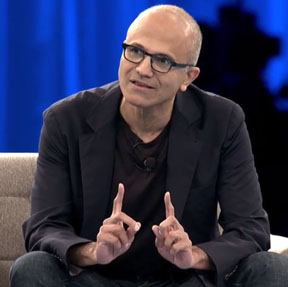
WASHINGTON: Silicon Valley’s top executives, including India-born CEOs Google’s Sundar Pichai and Microsoft’s Satya Nadella, condemned President Donald Trump’s immigration ban on people from seven Muslim-majority countries, voicing concern that the move could directly hit their own staffers and stop bringing great talent to the US.
Executives from Microsoft, Google, Apple, Netflix, Tesla, Facebook, Uber and other top American companies slammed Trump’s immigration order that sparked widespread protests across the US.
Trump had signed a sweeping executive order to suspend the arrival of refugees and impose tough new controls on travelers from Iran, Iraq, Libya, Somalia, Syria and Yemen, as part of new measures to “keep radical Islamic terrorists” out of America.
Condemning the move, Nadella, in a post on LinkedIn, said “As an immigrant and as a CEO, I’ve both experienced and seen the positive impact that immigration has on our company, for the country, and for the world. We will continue to advocate on this important topic,”
Microsoft President Brad Smith said as many as 76 Microsoft employees are affected by this new executive order.
“We appreciate that immigration issues are important to a great many people across Microsoft at a principled and even personal level, regardless of whether they personally are immigrants. Satya has spoken of this importance on many occasions, not just to Microsoft but to himself personally.
He has done so publicly as well as in the private meetings that he and I have attended with government leaders,” Smith said.
“As a company, Microsoft believes in a strong and balanced high-skilled immigration system,” he said.
Pichai also criticized Trump’s controversial immigration order saying it will create “barriers” to bringing great talent to the US. The Internet search giant also ordered its travelling staff to return to America.
Pichai in an email to staff said the US ban on foreign nationals from seven Muslim-majority countries will hit nearly 200 Google employees.
“It is painful to see the personal cost of this executive order on our colleagues. We’re upset about the impact of this order and any proposals that could impose restrictions on Googlers and their families, or that could create barriers to bringing great talent to the US,” Pichai said.
Facebook CEO Mark Zuckerberg was one of the first to address the ban publicly.
“We need to keep this country safe, but we should do that by focusing on people who actually pose a threat. Expanding the focus of law enforcement beyond people who are real threats would make all Americans less safe by diverting resources…,” he wrote on Facebook.
Zuckerberg called for keeping doors open to refugees and those who need help. “That’s who we are. Had we turned away refugees a few decades ago, Priscilla’s family wouldn’t be here today,” he said.
“My great grandparents came from Germany, Austria and Poland. Priscilla’s parents were refugees from China and Vietnam. The United States is a nation of immigrants, and we should be proud of that,” he asserted.
Twitter’s CEO Jack Dorsey also condemned the immigration order, saying the “humanitarian and economic impact of the ban is real and upsetting.”
“Twitter is built by immigrants of all religions. We stand for and with them, always,” Twitter said.
“We benefit from what refugees and immigrants bring to the US,” Dorsey said.
Apple CEO Tim Cook expressed concern over the order, saying his company’s success is because of the immigrants.
“I’ve heard from many of you who are deeply concerned about the executive order issued restricting immigration from seven Muslim-majority countries. I share your concerns. It is not a policy we support,” he wrote to his employees.
“There are employees at Apple who are directly affected by the immigration order. Our HR, Legal and Security teams are in contact with them, and Apple will do everything we can to support them,” he said.
The Internet Association president and CEO Michael Beckerman said the internet industry is deeply concerned with the implications of Trump s executive order.
“While this order impacts many companies outside of the tech industry, internet companies in particular thrive in the US because the best and the brightest are able to create innovative products and services right here in America,” he said.
“While we support President Trump s efforts to grow our economy and allow people of great talent to come into the US, the executive order has troubling consequences,” Beckerman said.
Internet Association member companies along with companies in many other industries include legal immigrant employees who are covered by these recent executive orders and will not be able to return back to their jobs and families in the US, he said.
“Their work benefits our economy and creates jobs here in the United States. We maintain our support for immigration reform and will work with Congress and the Trump Administration on this important issue for families and our economy, Beckerman said.
Uber chief executive Travis Kalanick said he will raise the issue with Trump when he along with other business advisers will meet the US President.
“The blanket entry ban on citizens from certain primarily Muslim countries is not the best way to address the country s challenges,” tweeted Elon Musk of Tesla.-PTI





